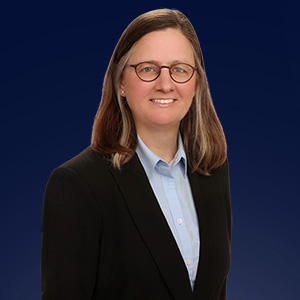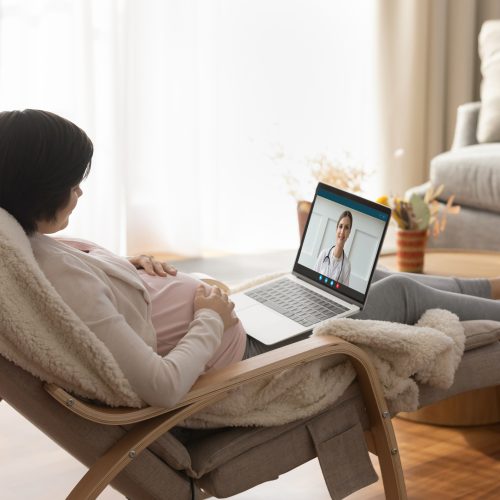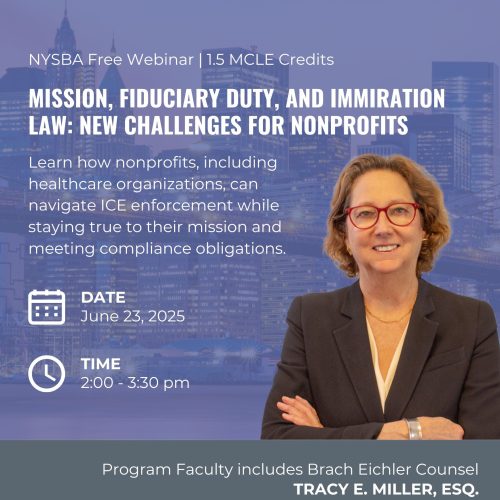The New Out-Of-Network Law: Our Responses to Your Questions

11/8/2018
The following is a summary of questions and answers which were submitted to Brach Eichler at the conclusion of our webinar entitled “The New Out-Of-Network Law: Are You Ready?” on August 22, 2018. Although the Law took effect on August 30, 2018, the New Jersey Department of Banking and Insurance (“DOBI”), the New Jersey Commissioner of Health, and relevant licensing boards in the New Jersey Division of Consumer Affairs must still adopt rules and regulations to effectuate the law. Therefore, the answers set forth in this document are subject to change.
This document is not intended to provide legal advice and should not be relied upon in lieu of consultation with an attorney. This document has been prepared for education and information purposes only. Transmission of the information set forth in this document is not intended to create, and receipt does not constitute, a lawyer-client relationship between the authors and a recipient.
1. Are you able to collect a partial payment up front in the office and bill the rest after the insurance pays? At what point is the bill considered “attempted to collect” and able to be written off?
If a patient knowingly, voluntarily, and specifically selects an out-of-network (“OON”) provider for health care services after the provider provides full disclosure of OON status as required by the Out-of-Network Consumer Protection, Transparency, Cost Containment and Accountability Act (the “Act”), the provider can bill the patient in full or partially at the time of service. However, if the provider provides services to the patient on an inadvertent, emergency, or urgent basis, the provider may not bill the patient, except for the applicable deductible, copayment, or coinsurance that would apply if the patient had utilized an in-network health care provider for the services.
Based on proposed guidance released by DOBI, it is anticipated that an OON provider might be permitted to write off all or part of a patient’s deductible, copayment, or coinsurance required under the patient’s health benefits plan if the provider fails to collect the covered person’s deductible, copayment, or coinsurance after making reasonable collection efforts. Reasonable efforts do not necessarily include initiating collection proceedings.
2. In cases where the provision for arbitration does apply (i.e., emergency care), what happens if parties cannot reach agreement but are less than $1000 apart?
The Act does not address this point nor has DOBI promulgated regulations about this issue. Perhaps it will be addressed in future regulations.
3. We are asked for an estimated out of pocket for pathology. It is dependent on which lab it is sent to and how many specimens are taken. Prior to a surgery, we cannot state the amount. What do we do?
For a non-emergency or elective procedure performed in an office setting, a health care professional who is a physician must provide the patient with the name, practice name, mailing address, and telephone number of any health care provider scheduled to perform laboratory and/or pathology services in connection with care to be provided by the health care professional. This information should be provided at the time the procedure is scheduled to the extent the health care professional knows the information. The health care professional must also provide instructions as to how the patient is to determine the health benefits plans in which such other health care providers participate, such as advising the patient to contact the other providers directly. The health care professional must also recommend that the patient contact the patient’s carrier for further consultation on costs associated with these services.
For a non-emergency or elective procedure performed in a hospital or ASC setting, a health care professional who is a physician must provide the patient and the facility with the name, practice name, mailing address, and telephone number of any other physician, whose services will be arranged by the physician and whose services are scheduled at the time of the pre-admission, testing, registration, or admission at the time the services are scheduled. The health care professional must also provide information as to how to determine the health benefits plans in which such other physician participates, such as advising the patient to contact the other physician directly. The health care professional must also recommend that the patient contact the patient’s carrier for further consultation on costs associated with these services. If other physician services, such as pathology, are being arranged by the facility, as opposed to the health care professional, the health care professional should advise the patient at the time the services are scheduled to contact the facility for more information on those specific costs.
4. Does this mean that, if we do a biopsy or Pap smear in the office, we are obligated to determine if the patient’s insurance will pay for the fees for reading the biopsy or Pap smear?
No. A health care professional who is a physician must provide the patient with the name, practice name, mailing address, and telephone number of the health care provider scheduled to perform pathology services. This information should be provided at the time the procedure is scheduled to the extent the health care professional knows the information. The health care professional must also provide instructions as to how the patient is to determine the health benefits plans in which such other health care providers participate, such as advising the patient to contact the other providers directly. The health care professional must also recommend that the patient contact the patient’s carrier for further consultation on costs associated with these services.
5. Who creates the fees for arbitration? The arbitrator’s fees will make this moot for physician-provided services going to arbitration. The physician will end up paying as much or more in arbitrator fees as his bill is worth. What are your observations?
This is not addressed in the Act and DOBI has not released any guidance on this point.
6. Do all health care facility standard fees have to be disclosed to patients or just case specific?
Health care facilities must make available to the public a list of the facility’s standard charges for items and services provided at the facility. “Health care facilities” are defined in the Act as hospitals, satellite emergency departments, hospital-based off-site ambulatory care facilities in which ambulatory surgical cases are performed, and ambulatory surgery facilities.
7. So essentially, there is no more self-pay? We must now submit all claims to these OON payors?
No. The provisions of the Act requiring claims to be submitted directly to OON payors are only applicable for inadvertent OON services and OON emergency and urgent services. If a patient knowingly, voluntarily, and specifically selects an OON provider for health care services after the provider provides full disclosure of OON status as required by the Act, the provider can bill the patient directly.
8. What are the requirements for a health care provider to bill the patient for all allowable deductible and co-insurance whether in or out of network? Can you write off? How many statements do you have to send to the patient? What are you allowed to say to the patient?
Both in-network and OON providers must bill patients for their deductible, copayment, or coinsurance required under the applicable health benefits plan. In-network providers typically have a contractual obligation to do so.
In addition, the Act expressly prohibits an OON health care provider from knowingly waiving, rebating, giving, paying, or offering to waive, rebate, give, or pay all or part of the deductible, copayment, or coinsurance owed by a patient pursuant to the terms of the patient’s health benefits plan as an inducement for the patient to seek health care services from that provider.
The Act does not address how many statements a provider must send to a patient. However, based on proposed guidance released by DOBI, it is anticipated that an OON health care provider might be permitted to waive all or part of a patient’s deductible, copayment, or coinsurance if either:
- The waiver is not offered as part of any advertisement or solicitation (thus, the patient should not be offered the waiver in advance); and the provider does not routinely waive, rebate, give, pay, or offer to waive, rebate, give, or pay all or part of a patient’s deductible, copayment, or coinsurance; and the provider waives all or part of a patient’s deductible, copayment, or coinsurance after determining in good faith that the patient is in financial need or after failing to collect the patient’s deductible, copayment, or coinsurance after making reasonable collection efforts; or
- The waiver, rebate, gift, payment, or offer falls within any safe harbor under federal laws related to fraud and abuse concerning patient cost sharing.
9. Is an ASC required to provide standard charges in writing? Is an acknowledgement required for providing charges?
Each health care facility must make available to the public a list of the facility’s standard charges for items and services provided at the facility. The Act does not require patient acknowledgement of the list.
10. If a patient knowingly sees a physician that is OON and they need a surgery at an OON facility, do they need to be informed of all costs all the way through care? i.e., during each visit do they need to be told the cost estimate, or only upon request? If a patient accepts OON to see a physician, do they continuously need to be informed of estimates through all stages of care?
Prior to scheduling a procedure, the OON physician must disclose to the patient that the physician is OON and that the amount or estimated amount for the services is available upon request. Upon a patient request for the services, the physician must provide in writing the amount or estimated amount for the services. The estimate should include costs associated with the entire course of care, including pre-admission testing and associated post-operative follow-up visits, for example. Furthermore, the patient must be advised to contact the patient’s carrier for further consultation on the cost. For other services, the appropriate disclosures should be made prior to scheduling appointments.
11. What information must ambulatory surgery facilities disclose to patients?
Ambulatory surgery facilities are subject to a number of patient disclosure requirements prior to the provision of non-emergency services. Please reference the webinar slides for further details.
12. Is the obligation to collect co-payments and deductibles based on the carriers’ allowed amount or based on the provider’s billed amount?
An OON provider is required to collect deductibles, copayments, or coinsurance pursuant to the terms of the patient’s health benefits plan. The carrier is required to inform the provider of the patient’s responsibility in the explanation of benefits/remittance advice issued by the carrier to the provider.
13. Will the Fair Health database be used as the database for arbitration?
The Act does not specify use of the Fair Health database for arbitration.
14. Is it the emergency room doctor’s role to inform the patient that they are electing use of an out-of-network consultant?
No. The patient disclosure requirements set forth in the Act are not applicable for services provided on an emergency or urgent basis.
15. Can an OON provider collect in-network deductibles?
An OON provider may only collect the in-network deductible, copayment, or coinsurance amount for inadvertent OON services and OON emergency and urgent services. Otherwise, the OON provider should collect appropriate OON deductibles, copayments, and coinsurance.
16. Can we just give patients the name of the physician or facility with phone number so the patient can find out if the person we are referring them to is participating or not?
A health care professional who is a physician must provide the patient with the name, practice name, mailing address, and telephone number of any health care provider scheduled to perform anesthesiology, laboratory, pathology, radiology, or assistant surgeon services referred by the professional. Such information must be provided at the time of a referral to the provider. The health care professional must also provide instructions as to how the patient is to determine the health benefits plans in which such other health care provider participates, such as advising the patient to contact the other provider directly. The health care professional must also recommend that the patient contact the patient’s carrier for further consultation on costs associated with these services. Please note: Until more clarification is provided through the adoption of regulations, unless a physician knows the name of the particular provider who will be providing the above-referenced services, the physician will most likely only be able to provide the name of the applicable group practice.
17. Does the new law affect the Health Insurance Primary for No Fault cases? We have many patients that are MVA patients and have HI as the primary and most of them are OON. In cases where the patient has MVA as primary, and commercial as a secondary out of network, do we need to disclose the OON benefits?
The definition of “health benefits plan” in the Act specifically excludes coverage arising out of automobile medical payment insurance and personal injury protection insurance. But, the Act does not expressly address circumstances where there is a secondary payor that is covered by the Act.
18. Do health care professionals have to list CPTs and fees, or alert patients that they are available upon request?
Prior to scheduling a non-emergency procedure, an OON health care professional must inform the patient that the health care professional is OON and that the amount or estimated amount is available upon request. Upon receipt of a request from a patient for a service and the CPT codes associated with that service, the professional must provide the patient in writing with the amount or estimated amount that the professional will bill the patient for the service including other CPT codes associated with that service.
19. How do we know if a self-funded plan opts in?
Based on proposed guidance released by DOBI, it is expected that self-funded benefits plans will be required to issue identification cards to participants. The cards will be required to indicate whether the plan is participating in arbitration pursuant to the Act.
20. If a professional’s DME carrier or pathology provider is OON and the vendor does not plan on balance billing, what is the professional’s disclosure responsibility?
The Act does not expressly require professionals to disclose information regarding DME providers. With regard to pathology, a health care professional who is a physician must provide the patient with the name, practice name, mailing address, and telephone number of any health care provider scheduled to perform laboratory and/or pathology services. This information should be provided at the time of scheduling a procedure to the extent the health care professional knows the information. The health care professional must also provide instructions as to how the patient is to determine the health benefits plans in which such other health care provider participates, such as advising the patient to contact the other provider directly. The health care professional must also recommend that the patient contact the patient’s carrier for further consultation on costs associated with these services. The health care professional is required to provide these disclosures regardless of how the pathology provider intends to bill for services.
21. If an MRI center is OON, can the MRI center charge OON deductible and co-insurance?
If a patient knowingly, voluntarily, and specifically selects an OON MRI center for health care services after the MRI center provides full disclosure of OON status as required by the Act, the MRI center can charge the OON deductible and co-insurance.
22. If a patient comes to an OON ASC and the carrier pays very low reimbursement, can the ASC arbitrate for a higher rate?
Under the Act, the ASC may arbitrate with the carrier for a higher rate if the patient receives services on an emergency or urgent basis. If the patient knowingly, voluntarily, and specifically selects the OON facility after the facility has complied with its disclosure requirements to the patient pursuant to the Act, the facility can balance bill the patient.
23. Can an ASC honor in-network benefits and waive OON benefits?
No. If an ASC is OON, and the service is not an emergency or urgent service, the ASC must charge the patient the applicable OON deductible, copayment, or coinsurance.
24. Does an ASC have to document to in-network patients the suggested script about patient responsibility for all potential services prior to appointment scheduling? Is the physician practice responsible or the ASC?
The ASC and the physician practice each have separate disclosure requirements under the Act prior to scheduling an appointment. Please reference the webinar slides for further details. Brach Eichler can provide copies of these slides upon request.
25. What exactly is required for emergency care by a provider for services at a hospital, e.g., emergency appendectomy?
For emergency services, there are no disclosure requirements prior to treatment. Billing restrictions do apply if the provider is OON.
26. A patient goes to the Emergency Room at an in-network-facility with a small laceration and requests a plastic surgeon. The plastic surgeon is OON and goes to the ER to repair this laceration at the patient’s request even though the ER physician would have done it. Can the plastic surgeon still charge the plastic surgeon’s OON fee? Or does the plastic surgeon have to accept the in-network rate? As a twist on this, sometimes the ER calls the plastic surgeon with regard to a patient laceration and the plastic surgeon has the patient sent to his/her office where the laceration is repaired. The patient is not in an in-network facility anymore and went to the plastic surgeon’s office by choice. Can the plastic surgeon charge his/her normal OON fee?
If the procedure is performed in the emergency room, the plastic surgeon can only charge the patient the applicable in-network rate. However, if the patient knowingly, voluntarily, and specifically selects the OON plastic surgeon to repair the laceration in the surgeon’s private office, the OON plastic surgeon can charge his/her OON fee.
27. What are the obligations of insurance carriers to provide a correct provider directory for anesthesiologists? Currently they do not list individual anesthesiologist or group names.
The Act does not expressly address the content of the directory with this level of specificity. However, carriers are required under the Act to provide information as to the network status of a health care provider to covered persons who request such information.
28. If a physician does not disclose the contact information for the anesthesiologist, what happens?
The physician is required to disclose this information if the physician is arranging the anesthesia service and may be subject to various penalties under the Act for any violation. For example, health care professionals may be fined $100 for each violation of the Act, with every day that the violation occurs being considered a separate obligation, up to a limit of $2,500 for each occurrence.
29. What are the obligations of insurance carriers to provide to providers their complete rental network and companies utilizing those networks?
The Act does not address this.
30. How does the New Jersey Administrative Code (which indicates that the an insurance company cannot make the patient liable for more than they would normally be liable for had they gone in-network) fit in with this legislation?
N.J.A.C. 11:22-5.8(b) provides that, in general, insurance plans issued in New Jersey shall provide the following:
- That a covered person’s liability for services rendered during a hospitalization in a network hospital, including, but not limited to, anesthesia and radiology, where the admitting physician is a network provider and the covered person and/or provider has complied with all required preauthorization or notice requirements, shall be limited to the copayment, deductible, and/or coinsurance applicable to network services; and
- That a covered person’s liability for services rendered during a hospitalization in a network hospital, including, but not limited to, anesthesia and radiology, where the admitting physician is an OON provider, shall be limited to the copayment, deductible, and/or coinsurance applicable to network services.
Prior to the enactment of the Act, under N.J.A.C. 11:22-5.8(b), for OON services provided during an in-network hospital admission, carriers either had to pay the OON provider’s charges or negotiate a settlement to ensure that the patient was held harmless from the OON charges. The Act eliminates the OON provider’s leverage in these situations, since the OON provider is no longer able to balance bill the patient in these cases. Also, by establishing a mechanism for arbitrating OON claims between providers and carriers, the Act has provided the carriers with an arbitration alternative to either paying the OON provider’s charges or agreeing to a settlement.
31. Are ASCs required to have a website or only post information if they have a website?
The Act does not require ASCs to have websites. If an ASC has a website, it must post the information required by the Act.
32. Are registered surgical practices required to comply with the Act?
Registered surgical practices must comply with the provisions of the Act applicable to health care professionals.
33. The hospital association recently stated you must share your fee schedule with patients. Is that correct or must we just make patients aware of potential co-pays and deductibles?
Health care facilities such as hospitals and licensed ASCs must make available to the public a list of the facility’s standard charges for items and services provided at the facility. On the other hand, health care professionals must inform the patient that the health care professional is OON and that the amount or estimated amount is available upon request. Upon receipt of a request from a patient for a service and the CPT code associated with that service, the professional must provide the patient, in writing, with the amount or estimated amount that the professional will bill the patient for the service and the CPT codes associated with that service.
34. Do ASCs have to post which insurance carriers they are in-network with? Do they also have to post which plans each provider is in and OON with?
ASCs must post on their websites the health benefits plans in which the facility is a participating provider. They do not have to post the health benefits plans in which the individual professionals who may provide services at the ASC are participating providers.
35. Will this law affect physician offices that do office-based/in-office infusions?
Yes, physician offices that do office-based/in-office infusions are subject to the Act.
36. After billing an insurance company that is subject to the Act, a physician is required to bill the patient their deductible and coinsurance. Is the physician also required to bill the patient the amount above the insurance allowable (meaning the difference between the billed charge and the insurance allowable)?
When an OON physician provides services on an inadvertent, emergency, or urgent basis, the OON physician must not balance bill the patient. While the Act does not expressly address balance billing in the OON situation (other than copayments, deductibles, and coinsurance, which may not be waived), generally, when a patient knowingly, voluntarily, and specifically selects the OON physician after the physician provides full disclosure of OON status as required by the Act, the OON physician should bill the patient for his/her OON responsibility in a way that is consistent with the bill that was submitted to the carrier; that is, an OON physician should bill the patient for the entire portion of the billed charges not covered by the carrier.
37. Does the Act apply to only new patients or does it apply to already established patients as of 08/30/18?
The Act applies to all health services provided as of and after August 30, 2018, regardless of whether the patient receiving the services is a new patient or an existing patient.
38. Does the law require an OON physician (in an in-network facility) to only bill a patient his/her in-network liability (hold harmless)? The waiver prohibition is problematic precisely because more patients have high deductible plans they cannot afford, but it seems inaccurate to state that a physician is violating the prohibition by only collecting in-network rates.
The Act requires an OON physician to only bill a patient his/her in-network liability when services are provided on an inadvertent, emergency, or urgent basis. However, when a patient knowingly, voluntarily, and specifically selects an OON physician after the physician provides full disclosure of OON status as required by the Act, the OON physician must bill the patient the applicable OON rates, except under limited circumstances. See answer #8 regarding when the waiver of a patient’s deductible, copayment, or coinsurance is permissible.
39. As an out-of-network provider, we cannot waive the deductible or copayment. Can we charge the patient the “in-network” deductible and copayment, and accept the OON payment from the insurance? Of course fully disclosing to the patient that the physician is OON. This would be with regard to an elective procedure or just an office visit. We understand for an emergency or urgent care, an OON provider can only bill the patient the in-network deductible or copayment, and if the provider does not agree with the payment from the insurance carrier they can arbitrate.
No. Except for inadvertent OON services, emergency, and urgent services, the Act does not allow an OON provider to only charge the patient the in-network deductible or copayment. See answer #8 regarding when the waiver of a patient’s deductible, copayment or coinsurance may be permissible.
If you have additional questions about the new out-of-network law, please contact John Fanburg at 973-403-3107 or jfanburg@bracheichler.com or Carol Grelecki at 973-403-3140 or cgrelecki@bracheichler.com.
Related Practices: Healthcare Law
Related Attorney: John D. Fanburg, Carol Grelecki
Related Industry: Healthcare














